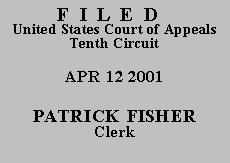

| JEFFREY R. MULBERRY,
vs.
GARY NEET and ATTORNEY
GENERAL OF THE STATE OF
COLORADO |
|
Plainly, Mr. Mulberry has not demonstrated exhaustion, which he is required to do under § 2241. Montez, 208 F.3d at 866. In Colorado, habeas corpus is a limited remedy, and a petitioner must first exhaust his legal remedies, beginning in the district court. Murray v. Henderson, 964 P.2d 531, 533 (Colo. 1998); Duran v. Price, 868 P.2d 375, 377 (Colo. 1994). Here, Colo. Crim. P. 35 (c) provides a legal remedy for Mr. Mulberry's claim that his sentence has been fully served or that he is entitled to more immediate discharge.
Mr. Mulberry is also mistaken that he exhausted state court remedies by seeking a writ of habeas corpus directly (original jurisdiction) from the Colorado Supreme Court. We agree with the state that "[u]sing a state procedure that is discretionary and limited in scope is not fair presentation" to the state courts, as required to exhaust state remedies. Aplee. Br. at 10; see also Castille v. Peoples, 489 U.S. 346, 351 (1989); Parkhurst v. Shillinger, 128 F.3d 1366, 1369 (10th Cir. 1997). The mere fact that the Colorado Supreme Court exercised its discretion to deny the petition in a formulary order does not mean that the court passed on the merits. Meredith v. Zavaras, 954 P.2d 597, 600 n.5 (Colo. 1998). We recognize that the Colorado Supreme Court has exercised its mandamus jurisdiction in the past to require the CDOC to comply with state district court orders concerning sentencing, but it has done so after the district court passed on the underlying issues. People v. Grangruth, 990 P.2d 697, 699-700 (Colo. 1999) (presentence confinement credit); Meredith, 954 P.2d at 598-600 (same); see also Bullard v. Dep't of Corrections, 949 P.2d 999, 1000 (Colo. 1997) (discharge order). Those cases are distinguishable not only because they involve mandamus jurisdiction, but also because here the state district courts have not passed on Mr. Mulberry's claims.
We DENY the motion to proceed in forma pauperis, DENY a certificate of appealability, see Slack v. McDaniel, 529 U.S. 473, 482 (2000), and DISMISS the appeal.
Entered for the Court
Paul J. Kelly, Jr.
Circuit Judge
*. This order and judgment is not binding precedent, except under the doctrines of law of the case, res judicata, and collateral estoppel. This court generally disfavors the citation of orders and judgments; nevertheless, an order and judgment may be cited under the terms and conditions of 10th Cir. R. 36.3.
2. After examining the briefs and the appellate record, this three-judge panel has determined unanimously that oral argument would not be of material assistance in the determination of this appeal. See Fed. R. App. P. 34(a); 10th Cir. R. 34.1 (G). The cause is therefore ordered submitted without oral argument.